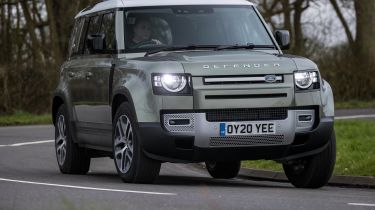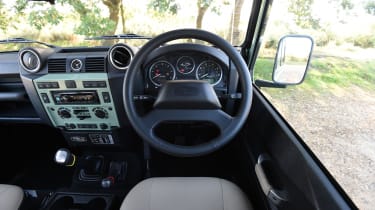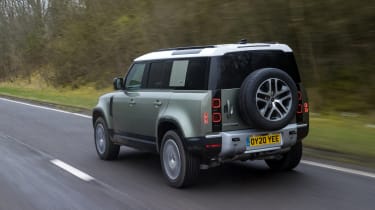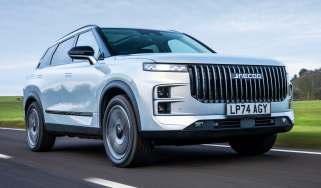Land Rover Defender: old vs new comparison
The new Land Rover Defender is finally here and is completely different to its predecessor - we assess the changes
It’s unlikely there has ever been two successive versions of a car that have been so different. The Land Rover Defender is an automotive icon and the new model finally reached showrooms in early 2020 after a prolonged development that lasted a whole four years longer than initially planned.
Besides its go-anywhere ability, you wouldn’t necessarily think the new Land Rover Defender is made by the same company as the previous one. The latter was known for its basic interior and outdated engines that were dirty, slow and noisy. By contrast, the new Defender has all the very latest technology, and gets a range of modern diesel and petrol engines from across the current Jaguar Land Rover lineup.
The three-door Defender 90 is now on sale
Design
When the old Defender was discontinued in 2016, the styling had barely changed since the car’s introduction in the early 1980s - and even that was reminiscent of the first Land Rovers from 1948. For many people, that was and remains a big part of the car’s charm, and its long production run and popularity mean replacement parts and upgrades are easy to find.
It’s clear that the new Defender channels the spirit of its predecessor with details like the ‘Alpine’ windows in the roof, the round headlights, domed bonnet and the sheer boxiness - but Land Rover has brought the design completely up to date. There are some really intricate details and crisp lines, but you can still order old-school steel wheels if you’re after the no-nonsense look. If you want a more luxurious appearance for the car, the Defender can sit on huge 22-inch gleaming alloy wheels.
Interior
The differences between old and new are just as stark inside. In the old car, most of the switchgear looks like it’s been used for several decades, and the whole cabin feels very dated compared to any modern SUV. Equipment levels were sparse, with the mid-range County boasting little more than a CD player. You might also be surprised to learn that the Defender didn’t offer much interior space given its chunky dimensions.
The new one, meanwhile, is a luxury product like the Range Rover. It’s still rugged-looking, with exposed bolt heads and a magnesium crossmember (part of the car’s structure) combining with the very latest technology. Even the least expensive version features LED headlights, heated seats, air suspension and surround-view cameras, and there are plenty more specs and options to ponder. You even get the choice of a ‘jump’ seat in between the two front seats, and all occupants will have enough space to get comfortable.
Performance
‘Driving’ an old Defender is probably the wrong word to describe it; ‘manhandling’ is more accurate. Everything’s heavy, from the steering to the clutch and gear lever, but once again that’s classed by many as part of the car’s charm. Performance is sluggish but it’s obviously not intended as a sports car. The single 118bhp diesel engine limits progress somewhat, with 0-62mph taking a lengthy 15.8 seconds and the car topping out at 90mph.
Land Rover has decided that’s not good enough for the new model, which is genuinely good to drive. The steering is alert and offers plenty of feel, and there’s surprisingly little body roll. Another area where the new car is worlds apart from the old one is performance; all models hit 0-62mph in under ten seconds and the fastest will breach that threshold in just six seconds.
Efficiency
We’ll not beat around the bush; Defenders are expensive to buy and even dearer to run. Land Rover claimed 28mpg (on the infamously over-optimistic NEDC test), but you’re unlikely to see 20mpg - especially if you’re using the Defender for the sort of hard work it’s built for. Supercar-matching CO2 emissions mean you’ll be stumping up a lot in tax, too.
The new car remains almost as thirsty as the old one. You should be able to manage around 30mpg in the D200 and D240, but you’ll struggle to hit 25mpg in any of the petrols. A plug-in hybrid is due soon, which should offer more reasonable fuel consumption and over 20 miles of electric-only range.
Off-roading
If you need to go deep into rough terrain or unexplored territory, a Defender has long been the number one choice. It’s why it’s the vehicle of choice for the military, explorers and the UN, and its off-road prowess makes up for its on-road shortcomings. Whether you’re faced with a deep ford, a slick muddy track or a perilous mountain scramble, the Defender will do most things with very little fuss.
Part of the reason for the protracted development of the new model was due to the rigorous testing programme. Land Rover spent months testing the Defender to its limits across the globe, from the Sahara desert to the Arctic Circle, so it would live up to the reputation of its forebear. As a result, it’s still one of the very best off-roaders this side of a Unimog, so you should have no qualms about using the Defender’s full potential. Land Rover even offers Explorer and Adventurer option packs with all the gear you’ll ever need.
Verdict
You can make your own mind up about the styling but the new Land Rover Defender is a huge improvement over the old car. It retains incredible off-road ability while offering much more technology, performance and choice, not to mention space. Like the old car, it has character in spades but you don’t have to live with so many of the compromises.
Read our Land Rover reviews here.
Recommended

New Subaru Trailseeker revealed as rugged electric SUV with 375bhp

New Subaru Solterra brings more range, power and polish
Most Popular

Suzuki’s new 10-year warranty is free – here’s how to get it

Omoda E5 targets rivals: now with zero deposit and APR
Tips & advice

Car dashboard warning lights: what does each symbol mean?

Electric car charging stations: public networks, charger types, apps and maps















